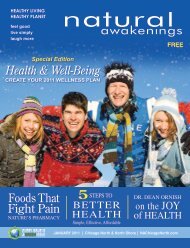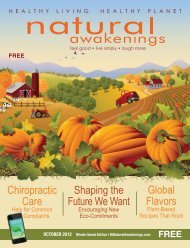STRAIGHTEN UP - Natural Awakenings
STRAIGHTEN UP - Natural Awakenings
STRAIGHTEN UP - Natural Awakenings
Create successful ePaper yourself
Turn your PDF publications into a flip-book with our unique Google optimized e-Paper software.
healthbriefs<br />
October is National Breast Cancer Awareness Month<br />
A<br />
Household Chemicals<br />
May Pose Risk for<br />
Breast Cancer<br />
study recently published in the journal Environmental<br />
Health reports that frequent use of common household<br />
cleaning products may increase a woman’s risk for breast<br />
cancer. The study was undertaken by the Silent Spring Institute,<br />
a partnership of scientists, physicians, public health<br />
advocates and community activists dedicated to identifying<br />
links between the environment and women’s health,<br />
especially breast cancer. Researchers conducted telephone<br />
interviews with 787 women diagnosed with breast cancer and 721 comparison<br />
women, questioning them about their product use, beliefs about breast cancer<br />
causes, and established and suspected risk factors.<br />
Executive Director Julia G. Brody, Ph.D., says, “Women who reported the<br />
highest combined cleaning product use had a doubled risk of breast cancer compared<br />
to those with the lowest reported use. Use of air fresheners and products for<br />
mold and mildew control were associated with increased risk. To our knowledge,<br />
this is the first published report on cleaning product use and the risk of breast cancer.”<br />
The use of insect repellents was also associated with increased risk.<br />
The Science Behind<br />
an Apple a Day<br />
According to Bahram H. Arjmandi, Ph.D., a<br />
registered dietician and chair of the Department<br />
of Nutrition, Food and Exercise Sciences at Florida<br />
State University, there is scientific truth in the adage,<br />
“An apple a day keeps the doctor away.” The nationally<br />
recognized nutrition researcher, a Margaret A.<br />
Sitton professor, maintains that apples are a “miracle<br />
fruit,” providing health benefits beyond fiber.<br />
Earlier animal studies have shown that the pectin<br />
and polyphenols in apples improve lipid metabolism and lower the production of<br />
pro-inflammatory molecules. Arjmandi’s new study is the first to evaluate the long-term<br />
cardio-protective effects of eating apples daily. He randomly assigned 160 women, ages<br />
45 to 65, to one of two dietary intervention groups: one received 75 grams of dried<br />
apples each day (the equivalent of four or five fresh apples); the other ate dried prunes.<br />
Arjmandi reports surprising results: “Incredible changes in the apple-eating<br />
women happened by six months—they experienced a 23 percent decrease in LDL<br />
[bad] cholesterol.” Daily apple consumption also led to lower levels of C-reactive<br />
protein, which is known to trigger inflammation in the body. In another unexpected<br />
benefit, the apple-eaters lost an average of 3.3 pounds.<br />
Source: Federation of American Societies for Experimental Biology<br />
14 Chicago North & North Shore www.NAChicagoNorth.com<br />
saffLower<br />
oiL — good for<br />
the heart<br />
S afflower oil, a common cooking<br />
oil, may help improve insulin<br />
sensitivity, lower inflammation and<br />
blood sugar levels, and elevate HDL<br />
(good) cholesterol in overweight<br />
women with Type 2 diabetes, according<br />
to new research from Ohio State<br />
University. The study also revealed<br />
that the oil helps reduce abdominal<br />
fat, which is linked to an increased<br />
risk of heart disease. The findings indicate<br />
that a daily dietary dose of one<br />
and two-thirds teaspoons is sufficient<br />
for a person to benefit from the oil’s<br />
Cautionary news<br />
about CaLCium<br />
New research published online in<br />
the British Medical Journal adds<br />
to mounting evidence that calcium<br />
supplements may increase the risk of<br />
cardiovascular events, particularly<br />
heart attacks, in postmenopausal<br />
women. Many older women take<br />
calcium supplements to manage<br />
osteoporosis, but after re-analyzing<br />
data on 16,718 women participating<br />
in the seven-year Women’s Health<br />
Initiative Calcium/Vitamin D Supplementation<br />
Study, researchers at the<br />
University of Auckland, in New Zealand,<br />
now urge reassessment of calcium<br />
prescriptions to maintain bone<br />
health. Their metastudy showed that<br />
postmenopausal women<br />
that took combined<br />
calcium and vitamin<br />
D supplements had<br />
increased risk of<br />
heart attacks.





